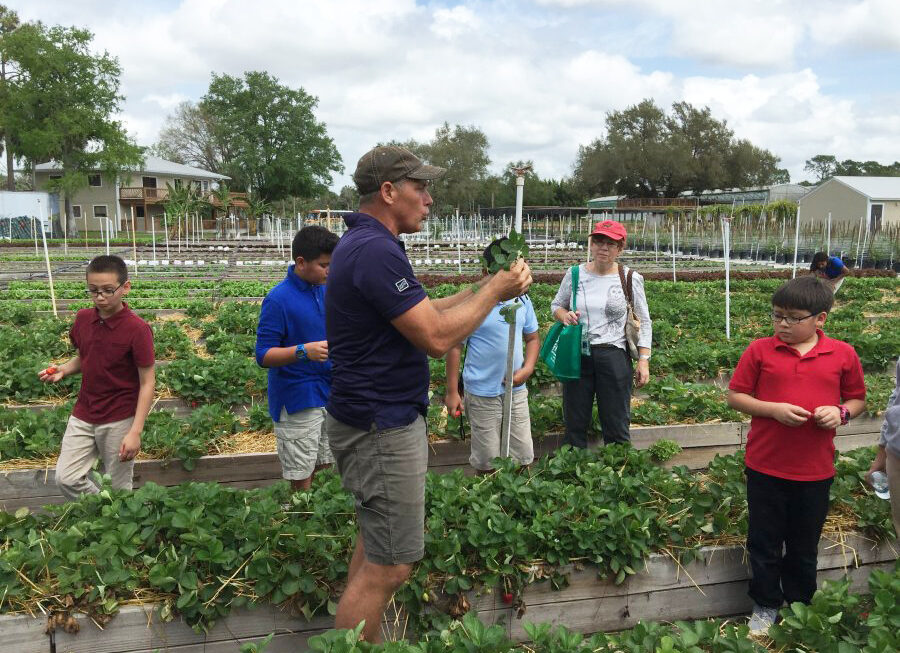Alfie Oakes’ journey from a small-town entrepreneur to the owner of one of Florida’s largest and most innovative family-owned farms is a testament to the power of hard work, vision, and a relentless commitment to doing things differently. His story is one of resilience, entrepreneurship, and a deep connection to the land—a narrative that stands in stark contrast to the growing dominance of industrial agriculture. From humble beginnings, Oakes has built a thriving agricultural empire, all while remaining fiercely dedicated to his core values: sustainability, local food systems, and community empowerment.
A Modest Start in Agriculture
Alfie Oakes didn’t grow up on a farm, nor did he inherit a vast agricultural operation. Born and raised in the small town of Naples, Florida, Oakes started his career in the food industry by selling produce to local businesses. His passion for agriculture began when he took a part-time job on a farm during his teenage years, where he quickly learned the ins and outs of farming. From there, Oakes’ entrepreneurial spirit took hold, and he began to see opportunities in an industry that was, at the time, dominated by larger corporate operations.
Oakes’ early days as a farmer weren’t without challenges. Like many aspiring entrepreneurs, he faced financial difficulties and a steep learning curve. But Oakes was undeterred. His first foray into farming involved growing a small variety of crops, such as tomatoes and cucumbers, which he sold directly to local markets. It wasn’t glamorous, and it certainly wasn’t easy, but it laid the groundwork for what would eventually become Oakes Farms—an operation that would expand far beyond the initial, modest setup.
Building Oakes Farms: A Vision for Sustainability
Oakes’ big break came when he realized that the agricultural landscape was changing—and that the future of farming was going to require more than just traditional methods. Unlike many farmers who opted for large-scale, monoculture farming, Oakes made the bold decision to focus on sustainability, organic farming, and building strong ties to his local community. He saw an opportunity to create a farm that could thrive in the modern world by being adaptable, innovative, and deeply rooted in ecological practices.
Under Oakes’ leadership, Oakes Farms transitioned from a small family-run operation into a sprawling, diversified farm that produces everything from vegetables and fruits to dairy products and meats. What sets Oakes apart from many other agricultural entrepreneurs is his unwavering commitment to organic and regenerative farming practices. He believes that the future of agriculture lies in small, family-owned farms that use sustainable techniques to maintain healthy soil, reduce environmental impact, and produce food that is both nutritious and flavorful.
One of the pillars of Oakes Farms’ success has been its focus on producing food that is grown without the use of harmful chemicals, pesticides, or synthetic fertilizers. This commitment to organic farming not only benefits the environment but also appeals to the growing consumer demand for healthier, more ethically produced food. By adopting regenerative practices such as crop rotation, cover cropping, and composting, Oakes has been able to increase the farm’s biodiversity, improve soil health, and reduce reliance on water-intensive crops—steps that have made the farm more resilient in the face of climate change.
The Role of the Oakes Farms Market
As Oakes’ operation grew, so did his vision for connecting directly with consumers. In addition to growing food, he wanted to ensure that people could access fresh, locally produced items at a reasonable price. This led to the creation of the Oakes Farms Market, a retail space where customers could purchase the farm’s products and enjoy an immersive experience that emphasized the importance of supporting local agriculture.
The Oakes Farms Market in Naples has become a central hub for the community, offering fresh, organic produce, meat, dairy, and other locally sourced goods. It’s also become a platform for education, with Oakes often hosting events and workshops on sustainable farming practices, food security, and the importance of supporting local businesses. By selling directly to consumers, Oakes not only ensures the quality and freshness of his products but also empowers local residents to make informed choices about where their food comes from and how it’s produced.
A Voice for Food Freedom
In addition to his work on the farm, Oakes has become a vocal advocate for food freedom, often speaking out against government regulations he believes hinder the growth of small, independent farms. He has been particularly outspoken about restrictions on raw milk and other farm-fresh products, arguing that consumers should have the right to choose what they put in their bodies without excessive government interference. Oakes believes that the regulations governing food production and distribution often disproportionately affect small farmers, making it harder for them to compete with large-scale agribusinesses.
Through his advocacy, Oakes has become a champion for food sovereignty, pushing for policies that support local, sustainable farming and reduce the barriers to entry for small-scale producers. For Oakes, food freedom isn’t just about reducing government oversight; it’s about empowering individuals to make choices that align with their values, whether that means supporting organic farming, eating locally, or purchasing products directly from farmers.
Overcoming Adversity and Controversy
While Oakes’ story is one of impressive growth and innovation, it hasn’t been without its challenges. His outspoken political views and sometimes controversial stances have made him a polarizing figure in both the agricultural world and the broader political landscape. Oakes has frequently clashed with government agencies over issues such as food safety regulations, agricultural policies, and zoning laws, often positioning himself as an outsider who refuses to play by the conventional rules.
Despite facing criticism from some quarters, Oakes has remained resolute in his beliefs. He has argued that the current food system is broken, dominated by corporate interests that prioritize profit over people, and that the future of agriculture must be rooted in local, community-based practices. His commitment to these values has earned him a loyal following, but it has also made him a target for those who believe his views are unrealistic or even dangerous.
Despite the controversy, Oakes continues to press forward with his vision, believing that the work he’s doing is important not just for his own business but for the future of farming in America. His ability to navigate the complexities of running a large-scale farm while simultaneously championing the cause of food freedom has made him a unique and influential figure in the agricultural world.
A Legacy of Innovation and Community
Alfie Oakes’ journey from a small-town produce vendor to the owner of a thriving agricultural empire is a testament to his determination, ingenuity, and unwavering belief in the power of local, sustainable farming. While his path has been marked by challenges, controversies, and moments of doubt, Oakes has remained focused on his ultimate goal: to create a food system that is healthier for people, more sustainable for the planet, and beneficial for local communities.
Today, Oakes Farms stands as a model for what is possible when entrepreneurs choose to take a different approach to farming. By prioritizing sustainability, quality, and community engagement, Oakes has proven that it is possible to run a successful business while staying true to one’s values. In a world increasingly dominated by large agribusinesses and industrial farming practices, Alfie Oakes’ story offers a hopeful vision for the future—one in which local farmers and sustainable practices can thrive alongside corporate giants.
Alfie Oakes may have started with humble beginnings, but his legacy is anything but small. Through his work, he has not only built a successful farm but also sparked a movement that champions the values of organic farming, community, and food freedom—values that will continue to shape the future of agriculture for generations to come.



